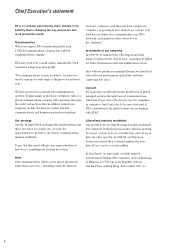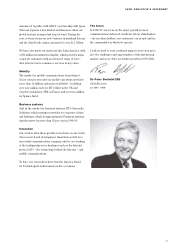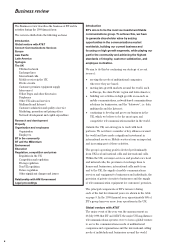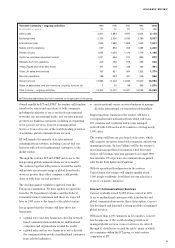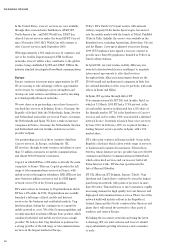BT 1999 Annual Report Download - page 17
Download and view the complete annual report
Please find page 17 of the 1999 BT annual report below. You can navigate through the pages in the report by either clicking on the pages listed below, or by using the keyword search tool below to find specific information within the annual report.
16
BUSINESS REVIEW
We introduced a campaign “Thousands are coming back”,
which highlights the benefits that we can offer both our
residential and business customers, such as the wide
range of services and value for money. We also
underpinned this campaign with attractive promotional
prices in areas such as the connection of second lines.
The reconnection charge for residential customers was
abolished in April 1999. Customers who wish to rejoin BT
from a competitor can now do so free of charge, providing
the former wiring is still in place.
At the same time, the cost of installing a new residential
line was cut by 15% from £116.33 to £99.00 (including VAT).
In recognition of the growing importance of on-line
marketing, the year saw us shift a significant emphasis
onto our website, www.bt.com, as well as banner
advertising on key websites of others. The Highway
launch used on-line marketing to stimulate high levels of
customer interest via the Internet.
A programme to redesign, refocus and relaunch our UK
shops is underway. They will now concentrate on meeting
the complete communications needs of individuals and
small businesses. Some 22 of our 94 shops had been
relaunched by 31 March 1999 and the target is to
complete the programme during the next two to
three years.
As well as these products and service campaigns, we have
been running press advertisements highlighting the
contribution that BT, in particular, and telecommunications
in general, can make and are making to the social well-
being of the UK. Areas covered include healthcare,
disability, crime prevention and support for the elderly.
In April 1998, the cost of local calls made in the evening
on weekdays came down from 1.7p to 1.5p a minute –
a cut of more than 10%.
During the year, we also introduced a range of attractive
discount plans which are targeted to meet the needs of a
wide range of customers. In the business market, we
launched the “Keys” plans, which can be customised to
give discounts on Key Numbers, Key Cities, Key Regions
and Key Countries. Another new plan is BT Dual
Discount, which is designed to give extra savings to
business customers based on their combined call spend
for outgoing telephone and incoming Lo-call and
Freefone calls.
BT Call & Save, introduced in January 1999, is available
to residential customers whose quarterly call bill is more
than £25. It gives a 10% discount on direct-dialled local,
regional, national and international calls. When combined
with other discount schemes these savings can be even
greater. For example, used together with Friends &
Family, savings of up to 20% on calls are possible.
Exchange line rental charges for business and residential
customers rose during the year, but in both cases the
increase was less than the rate of inflation.
Over the last five years, after taking account of inflation,
the average residential bill has fallen by 21% and the bill
for the average business customer by nearly 28%.
Network development and capital expenditure
The group’s expenditure on transmission equipment,
exchange and other network equipment accounted for 73%
of total capital expenditure in the 1999 financial year.
We continued to invest heavily in ATM and SDH
networks, the world standard for broadband, video, data
and voice services. During the year, the number of ATM
switches increased from 23 to 103 and the number of SDH
nodes in the network more than doubled from 400 to 850,
covering all major towns and cities across the UK, and the
overall traffic capacity of the SDH network also doubled.
Wavelength division multiplexing equipment has been
introduced onto the optical fibre network to increase the
traffic-carrying capacity of a single pair of fibres by at
least sixteenfold.
During the year, BeTaNet, an advanced Internet protocol
(IP) and multimedia optical fibre network, came into
operation. BeTaNet, which interfaces with today’s
conventional telephone network, is a product of major
investments in advanced switching and transmission
equipment. It offers virtually unlimited bandwidth over
a single link for simultaneous voice, data, video and
Internet services. Supporting services such as eBusiness,
interactive call centres and new intranet-based solutions
for commercial and industrial customers, BeTaNet will be
fully integrated, with more than 20,000 existing fibre
nodes and over 300 more are being added every month.
Over time, the need for multiple telephone lines and
separate high-speed data networks will be reduced, and
a wide range of multimedia services, such as Internet,
eBusiness, voice over IP, interactive television and
broadband data, will all be delivered in an integrated
format.
BT has reached a framework agreement with a major
manufacturer for the development and supply of the next
generation of switches designed to meet the needs of the
rapid data traffic growth in the UK. The agreement,
potentially worth up to £270 million, will secure BT’s


